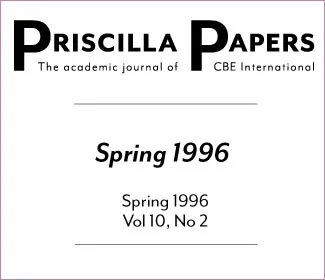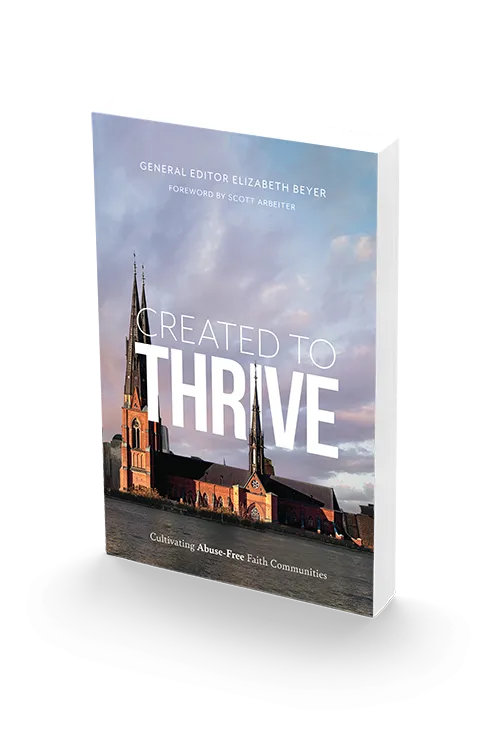“Does not wisdom call out? Does not understanding raise her voice? On the heights along the way, where the paths meet, she takes her stand; beside the gates leading into the city} at the entrances, she cries aloud…” Proverbs 8:1-3
In the Old Testament book of Proverbs, God’s infinite wisdom is personified as a woman. The association of divine wisdom with the feminine is not accidental. Social relationships in Israel reflected spiritual relationships between Israel and Yahweh. As a result of this basic analogy between the earthly realm and the heavenly realm, one can look to the feminine images of Hebrew scriptures to better understand personified wisdom. The Law and the Prophets provided the writer(s) of Proverbs with many feminine images (including home-maker, counselor and wise woman, and lover) that influenced their use of female imagery for divine wisdom. By better understanding the images of women portrayed in the Old Testament, one can gain insight into the nature of God’s wisdom.
Proverbs was written to teach young male students how to function in society and find meaning and order in the world. The proverbs are truths, inspired by and rooted in the Hebrew faith, that provide practical guidance for right living. In light of the fact that these proverbs were written for a male audience, it is ironic that, as a whole, Proverbs is united by recurrent female imagery and the personification of God’s wisdom as a woman.1 Chapters 1-9 and 31, which form the introduction and conclusion to the book of Proverbs, are especially pregnant with feminine imagery.
Personification is a literary device which is used to personalize an impersonal concept.2 A personification is capable of expressing a whole spectrum of meanings. The woman in Proverbs personifies God’s creative counsel and purpose, as well as God’s presence and active involvement in the world. She personifies the gift of wisdom given to humanity by God for guidance, enabling us to obey God’s commands and respond to God’s calling. She also personifies the order and meaning which God has implanted in creation, God’s general revelation. Lady-Wisdom, then, represents wisdom itself, in all its forms and manifestations. However, wisdom was neither understood nor worshipped as a goddess or a divine being independent of the one and only God. Neither is “Wisdom” ever used in Scripture as a substitute or alternative name for God.
Homemaker
The Old Testament image of homemaker is one which can shed light on Lady-Wisdom. Women enjoyed a “high status in the domestic realm where they could exercise both power and authority.”3 The bride and wife of Proverbs 4:5-9, the lifelong companion of 6:22 and 7:4, and the hostess of 9:1 are images of the Israelite woman who managed her household and gave it identity.4 Similar images of the woman as homemaker are found in Rebekah and Naomi, and in Esther whose concern was with the house of Israel. Lady-Wisdom, too, builds and manages her house and establishes a proper family life.5 She insures its security by protecting her disciples.6
The Israelite homemaker was the preparer of meals. The traditional female activity of meal preparation was essential to the identity and bonding of the community. The meal was a “practical but creative, indirect but effective, self-initiated but divinely-willed…setting for persuasion and decision for (or against) new or renewed life.”7 Lady-Wisdom and Folly, as meal-preparers, both persuade their listeners and require them to make a decision. One must discern between the good meal and the evil meal, symbols of good and evil life.
Folly, personified in Proverbs 9:13-18, represents the attractions and dangers of adultery and unfaithfulness. Like the serpent in the Garden of Eden, Folly convinces her listeners not that evil is good, but that evil consequences will not necessarily follow an evil act. She represents chaos, destruction and death.
Counselor
A second image of women prevalent in the Hebrew Scriptures is that of the “counselor” or “wise woman.” A wife and mother in Israel was responsible for handing wisdom down to her children and had the ability to influence her husband.8 The cultural image of the “behind-the-scenes advisor” in Israel was defined as female. In Proverbs, both Lady-Wisdom and Folly offer counsel. Lady-Wisdom’s good counsel bestows honor on her follower as the counsel of the good wife bestows honor on her husband (Pr 31). Folly’s counsel, on the other hand, leads her followers astray, “down to the chambers of death (Pr 7:27).” Lady-Wisdom’s counsel protects her followers from Folly’s deceptiveness in the same way that the counsel of the good wife protects her husband from the dangerous woman.
The values of the wise woman are covenant values: justice, well-being, and life.9 These are also Lady-Wisdom’s values.10 Lady-Wisdom uses the same tools as the wise woman: patience and a soft tongue (Pr 25:15), authority (24:5-6), and persuasion rather than coercion. Like the wise woman who calls out and pleads with the attackers of her city in 2 Samuel 20, Lady-Wisdom cries out and pleads on the streets and at the gates of the city (Pr 1:21).
In Proverbs 8:2, Lady-Wisdom appears “on top of the heights beside the way.” Scripture reveals that the temple or sacred place was usually located “on the height,” the holy point of contact between heaven and earth.11“The Way” represents God’s path of holiness.12 This is contrasted with the ways of Folly which lead to Sheol. Personified wisdom, then, is the metaphorical intermediary between God and humanity, the revelation of God’s will to humanity. As a counselor and wise woman, Lady-Wisdom gives her followers the choice of life or death: She offers them salvation.13
Lover
A third female image that may be used to understand Lady-Wisdom is the “lover.” Personified wisdom is a metaphor for the intimacy that exists between a man and woman in a love relationship. Themes of seeking and finding one’s lover are prevalent both in the Proverbs and in the Song of Solomon.14 God’s wisdom in Proverbs is poetically portrayed as a woman who loves and is beloved15 by any who will receive her offer. The love language of Proverbs 8 includes ideas of faithfulness and truth (8:7), righteousness and justice (8:20), and life (8:35), themes all related to the marriage covenant.
The relationship of God’s wisdom to humans is rooted in the idea of covenant love between a woman and a man. Like the love of the Song of Solomon, the love of wisdom is “a dynamic and vital force, a creative, divine power which unites a man and woman in an exclusive and lasting relationship.”16 An understanding of the proper relationship between a human person and divine wisdom must draw upon our personal experiences of human love, as well as our experiences of God’s love. Love language points to the relationship between divine and human that God’s wisdom provides.
Sexual fidelity is a metaphor for covenant faithfulness (Pr 5:15-20). Adultery symbolizes a violation of the covenant, infidelity towards Yahweh, the husband. Faithfulness to the covenant relationship between Israel and Yahweh is expressed in Proverbs through the condemnation of adultery. Adultery was absolutely intolerable in Israelite society because it threatened the social structure and violated the laws of God.
In Hosea, this theme of sexual fidelity is apparent: God, like Lady-Wisdom, seeks to find his lover (Pr 2:14). He invites but does not command love. Also like Lady-Wisdom, God refuses to take back the unfaithful spouse.17 In Hosea, God becomes “human-like” through poetic love language. In the same way, God’s wisdom, which has power and authority over humans, is made accessible through personification and love language.
Summary
While women’s roles were generally limited to the domestic sphere in traditional Israelite society, it is important not to underestimate the power and authority which women held within that domain. As the primary homemakers and caretakers, women were naturally viewed as the “arbiters of morality.” Women were obviously valued and esteemed by the writer of Proverbs, who “sees the most humanly attractive element in the divinity to be analogous to the feminine in humanity”18and so uses the noblest concepts of womanhood in Israel to call students to the path of life. That God’s wisdom should be characterized in feminine language indicates a real affirmation of and respect for women.
Lady-Wisdom, like the Israelite woman, provides identity and security for her “family,” protecting them from harm and evil. She brings honor to those who listen to her advice and heed her counsel. She invites her followers to a life of union. In light of these parallels, it is not surprising that in Proverbs God’s wisdom should be personified as a woman. Lady-Wisdom is uniquely able to teach us about a right relationship with the ultimate source of our knowledge, a relationship characterized by love, commitment and intimacy. She asserts God’s nearness, involvement with the world, and commitment to humanity.19 She is portrayed as a bridge between humanity and a transcendent God, between things secular and things divine.20 One finds God by finding wisdom, because wisdom ultimately comes from and belongs to God.
Notes
- Wisdom is also personified as a woman in Job 28 and in the Apocrypha (Sirach 24, Wisdom 6-9, Baruch 3-4,1 Enoch 42 and 2 Enoch 30).
- For other personifications in the Old Testament, see Psalms 45:4; 85:10; 107:42; Isaiah 51:9; Job 11:14.
- Claudia Camp, Wisdom And The Feminine In The Book Of Proverbs (Sheffield: Almond Press, 1985), 81.
- Genesis 30:1, 6, 8,11,13,18, 20, 23; 1 Samuel 1:11; 22-28; Proverbs 31.
- Proverbs 14:1; 24:3-4; 31; 5:15-29.
- Proverbs 2:11; 4:6; 6:22; 7:5.
- Camp, 137; Pr 9:6.
- Judges 13:22-23; 1 Samuel 24; 1 Kings 1:17-21, 21:7; Esther 5:15; 6:13; Daniel 5:10-12; Job 2:9; Proverbs 31:26.
- 2 Samuel 14 and 20, 2 Kings 4:8-10; 8:1-6.
- Proverbs 8:18-21, 32-36; 22:22-23; 23:10-11; 2:20-22.
- Jeremiah 17:12; 31:12; Ezekiel 17:23.
- 2 Samuel 22:31; Psalms 37:5; 86:11; Isaiah 30:21; 35:8.
- Proverbs 3:18, 22; 4:13, 22f; 8:35.
- Proverbs 1:28; 8:17; 8:35-36 and Songs 3:1-4,11; 5:2-8; 6:1-3; 8:1; 1:7-8; 2:8-9; 4:16-5:1; 8:5-6; 13-14.
- Proverbs 8:17; 4:6-9; 7:4.
- Nicolas J. Tromp, “Wisdom and the Canticle,” 94, quoted by Camp, 110.
- Proverbs 1:24-28; Hosea 2:7-13.
- Dermot Cox, Proverbs: With An Introduction To Sapiential Books (Wilmington: Michael Glazier, Inc., 1982), 76.
- Proverbs 4:4-8.
- Sirach 14,15, 51; Wisdom 6, 8.





